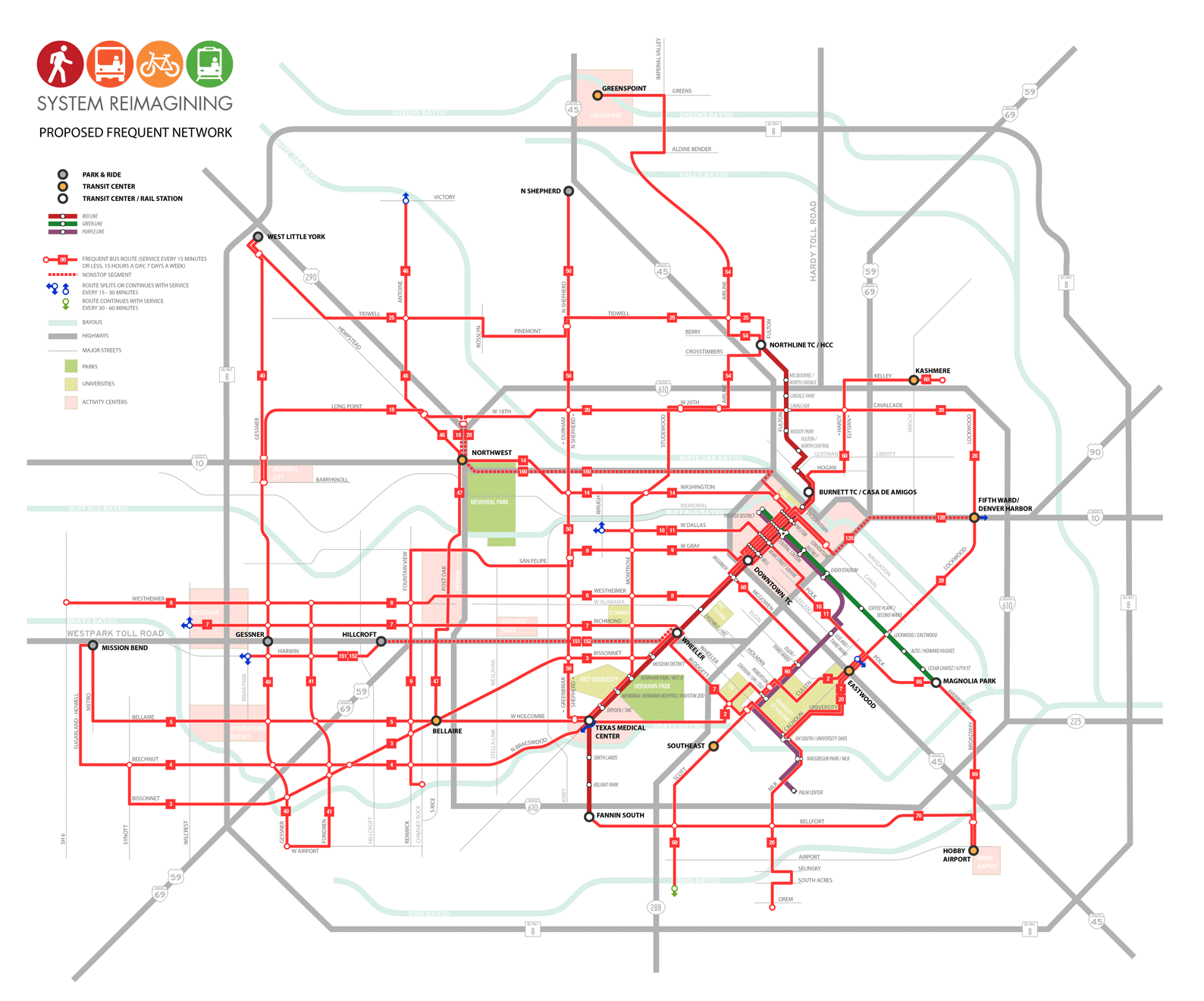Houston has proposed a large-scale overhaul of the Metro bus system. Based primarily on a high-frequency grid, the proposed plan would make sweeping changes to routes, nomenclature, and more. The plan will be a "must watch" for planners.
"Metro on Thursday released a draft of its 'reimagining' plan, intended as a broad upgrade to the region's bus system," reports Dug Begley. "Some officials said the plan could help increase ridership by 20 percent or more after two years."
"Metro buses, operating on a system largely developed in the 1980s, are essentially delivering the best service for the Houston of 1990," writes Begley in presenting the case for the upgrade. Specifically, "[the] system is based largely on an assumption that most people are trying to get downtown, although major employment centers have emerged elsewhere."
Begley's article quotes Jarrett Walker, who guided the redesign, in describing the obsolescence of the system: "Frankly, Houston is unique for how obsolete the system has gotten," says Walker.
Walker provides his own coverage of the proposal at his Human Transit blog, where he focuses especially on how much frequent network service will be gained by the overhaul—all without increasing operating costs. "The core idea of the new network is the high-frequency grid, designed to enable anywhere to anywhere travel with a single fast connection. Everywhere on the proposed network of red lines, that kind of easy access will be possible," explains Walker.
Eric Jaffe also examines the proposal, focusing on the frequent network but also some of the other improvements proposed by the plan: "The proposed system uses straighter routes and ties names to streets, which makes it more intuitive to navigate. It's an all-day system, which means riders get the same type of service on nights and weekends that they get during rush hours. Most importantly, the system connects to job centers all around the city instead of primarily the the downtown core, which creates better access between home and work."
A vote is likely in August or September. As Begley mentions in his coverage of the proposal, Metro officials are anticipating opposition, given the sweeping nature of the proposed changes.

FULL STORY: Metro unveils major change to bus service, awaits public outcry

Planetizen Federal Action Tracker
A weekly monitor of how Trump’s orders and actions are impacting planners and planning in America.

Chicago’s Ghost Rails
Just beneath the surface of the modern city lie the remnants of its expansive early 20th-century streetcar system.

Amtrak Cutting Jobs, Funding to High-Speed Rail
The agency plans to cut 10 percent of its workforce and has confirmed it will not fund new high-speed rail projects.

Ohio Forces Data Centers to Prepay for Power
Utilities are calling on states to hold data center operators responsible for new energy demands to prevent leaving consumers on the hook for their bills.

MARTA CEO Steps Down Amid Citizenship Concerns
MARTA’s board announced Thursday that its chief, who is from Canada, is resigning due to questions about his immigration status.

Silicon Valley ‘Bike Superhighway’ Awarded $14M State Grant
A Caltrans grant brings the 10-mile Central Bikeway project connecting Santa Clara and East San Jose closer to fruition.
Urban Design for Planners 1: Software Tools
This six-course series explores essential urban design concepts using open source software and equips planners with the tools they need to participate fully in the urban design process.
Planning for Universal Design
Learn the tools for implementing Universal Design in planning regulations.
Caltrans
City of Fort Worth
Mpact (founded as Rail~Volution)
City of Camden Redevelopment Agency
City of Astoria
City of Portland
City of Laramie



























